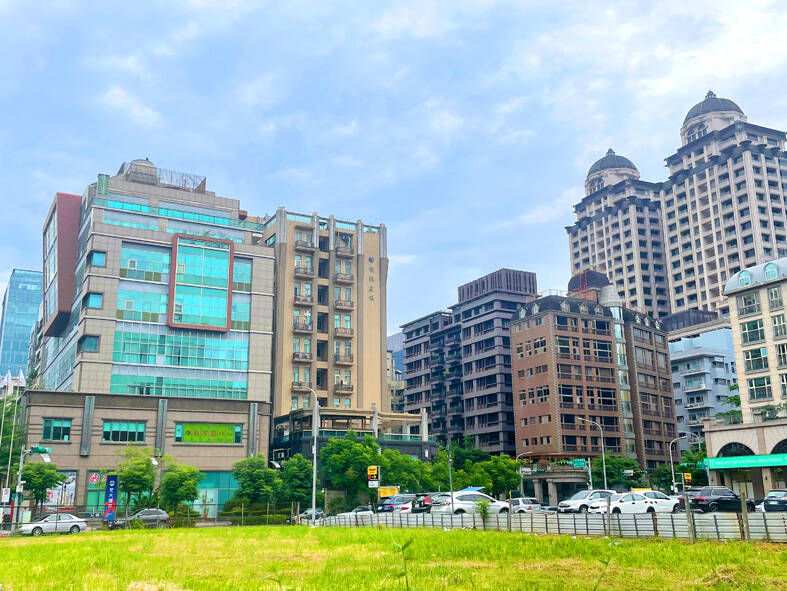Nearly 80 percent of Taiwan’s home buyers believe it is wise to wait on the sidelines until next year about whether to join the market, as economic uncertainty escalates and selective credit controls linger, a survey by Chinatrust Real Estate Co (中信房屋) showed yesterday.
The global political and economic landscape this year appears uncertain and volatile, casting a shadow on the nation’s economy and housing market, according to a quarterly survey conducted by the Taipei-based real estate broker.
Many Taiwanese turn cautious about the showings in the coming three months, when only 16.1 percent are looking at economic improvement, while 52 percent believe the situation would deteriorate and 31.9 percent think it would hold steady.

Photo courtesy of Chinatrust Real Estate Co
Although the Directorate-General of Budget, Accounting and Statistics last month forecast GDP growth of 3.14 percent for this year, downside risks have intensified since US President Donald Trump returned to the White House, and raised tariffs on different imports and threatened more, said Chuang Si-ming (莊思敏), deputy research manager at Chinatrust Real Estate.
Trump’s tariff hikes would drive up inflationary pressures and create unease among trade partners across the world, making any predictions complicated and difficult, Chuang said.
When asked when would be best to buy houses, nearly 80 percent of respondents believe they should wait and see until next year, and 20.5 percent said it would be wise to make a move in next six months, the survey found.
The findings represented a modest pickup of 3.7 percentage points from three months earlier, when only 16.8 percent entertained the idea of home purchases in the coming six months, which Chuang attributed to the effect of year-end bonuses, which bolstered the banking system’s deposits and eased overconcentration of real-estate lending.
Buying interest is particularly evident among first-home buyers, as they are qualified for favorable lending terms, Chuang said.
Regarding house prices near the plants of Taiwan Semiconductor Manufacturing Co (TSMC, 台積電), 53 percent of respondents believe they would go up, 31.9 percent are looking at stable prices and 10.4 percent forecast price corrections, the survey showed.
The mixed sentiments reflect rising concern over a sizable amount of TSMC capacity to be shifted from Taiwan to the US following the chipmaker’s recent announcement of an additional US$100 billion investment in the US, Chuang said.

France cannot afford to ignore the third credit-rating reduction in less than a year, French Minister of Finance Roland Lescure said. “Three agencies have downgraded us and we can’t ignore this cloud,” he told Franceinfo on Saturday, speaking just hours after S&P lowered his country’s credit rating to “A+” from “AA-” in an unscheduled move. “Fundamentally, it’s an additional cloud to a weather forecast that was already pretty gray. It’s a call for lucidity and responsibility,” he said, adding that this is “a call to be serious.” The credit assessor’s move means France has lost its double-A rating at two of the

AI BOOST: Although Taiwan’s reliance on Chinese rare earth elements is limited, it could face indirect impacts from supply issues and price volatility, an economist said DBS Bank Ltd (星展銀行) has sharply raised its forecast for Taiwan’s economic growth this year to 5.6 percent, citing stronger-than-expected exports and investment linked to artificial intelligence (AI), as it said that the current momentum could peak soon. The acceleration of the global AI race has fueled a surge in Taiwan’s AI-related capital spending and exports of information and communications technology (ICT) products, which have been key drivers of growth this year. “We have revised our GDP forecast for Taiwan upward to 5.6 percent from 4 percent, an upgrade that mainly reflects stronger-than-expected AI-related exports and investment in the third

Mercuries Life Insurance Co (三商美邦人壽) shares surged to a seven-month high this week after local media reported that E.Sun Financial Holding Co (玉山金控) had outbid CTBC Financial Holding Co (中信金控) in the financially strained insurer’s ongoing sale process. Shares of the mid-sized life insurer climbed 5.8 percent this week to NT$6.72, extending a nearly 18 percent rally over the past month, as investors bet on the likelihood of an impending takeover. The final round of bidding closed on Thursday, marking a critical step in the 32-year-old insurer’s search for a buyer after years of struggling to meet capital adequacy requirements. Local media reports

RARE EARTHS: The call between the US Treasury Secretary and his Chinese counterpart came as Washington sought to rally G7 partners in response to China’s export controls China and the US on Saturday agreed to conduct another round of trade negotiations in the coming week, as the world’s two biggest economies seek to avoid another damaging tit-for-tat tariff battle. Beijing last week announced sweeping controls on the critical rare earths industry, prompting US President Donald Trump to threaten 100 percent tariffs on imports from China in retaliation. Trump had also threatened to cancel his expected meeting with Chinese President Xi Jinping (習近平) in South Korea later this month on the sidelines of the APEC summit. In the latest indication of efforts to resolve their dispute, Chinese state media reported that